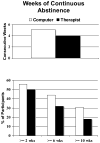An initial trial of a computerized behavioral intervention for cannabis use disorder
- PMID: 21131143
- PMCID: PMC3071451
- DOI: 10.1016/j.drugalcdep.2010.10.014
An initial trial of a computerized behavioral intervention for cannabis use disorder
Abstract
The most potent outcomes for cannabis use disorders have been observed with a combination of three evidence-based interventions, motivational enhancement therapy (MET), cognitive-behavioral therapy (CBT), and abstinence-based contingency-management (CM). Access to this intervention remains limited because of cost and service availability issues. This report describes the initial stages of a project designed to develop and test a computer-assisted version of MET/CBT/CM that could address many of the current barriers to its dissemination. A nonrandomized, 12-week comparison study assigned 38 adults seeking treatment for a cannabis use disorder to either therapist-delivered (n=22) or computer-delivered (n=16) MET/CBT/CM. Attendance, retention, and cannabis use outcomes did not differ significantly between groups, and there were no indications of superior outcomes favoring therapist delivery. Participants provided positive ratings of the computer-delivered sessions. These preliminary findings suggest that computer-assisted delivery of MET/CBT/CM is acceptable to outpatients and does not adversely impact compliance or outcomes achieved during treatment with MET/CBT/CM for cannabis use disorders. Assessment of post-treatment outcomes and replication in randomized trials are needed to determine reliability and longer term effects. As observed in a growing number of studies, computerized therapies have the potential to increase access to, reduce costs, and enhance fidelity of providing evidence-based treatments without sacrificing and possibly enhancing effectiveness.
Copyright © 2010 Elsevier Ireland Ltd. All rights reserved.
Figures

References
-
- Budney AJ, Higgins ST. A community reinforcement plus vouchers approach: Treating cocaine addiction. National Institute on Drug Abuse; Bethesda, MD: 1998.
-
- Budney AJ, Higgins ST, Radonovich KJ, Novy PL. Adding voucher-based incentives to coping-skills and motivational enhancement improves outcomes during treatment for marijuana dependence. J Consult Clin Psychol. 2000;68:1051–1061. - PubMed
-
- Budney AJ, Moore BA, Rocha HL, Higgins ST. Clinical trial of abstinence-based vouchers and cognitive-behavioral therapy for cannabis dependence. J Consult Clin Psychol. 2006;74:307–316. - PubMed
Publication types
MeSH terms
Grants and funding
LinkOut - more resources
Full Text Sources
Medical
Research Materials
Miscellaneous

